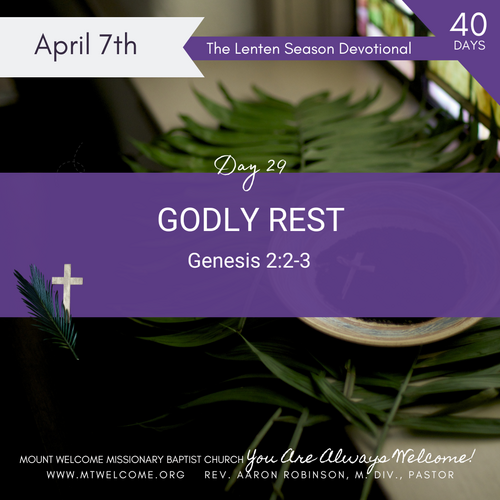Godly Rest
Godly Rest || Genesis 2:2-3 || Pastor Robinson

"And on the seventh day God finished the work that he had done, and he rested on the seventh day from all the work that he had done. So God blessed the seventh day and hallowed it, because on it God rested from all the work that he had done in creation." (Gen 2:2-3 NRSV)
In a world that celebrates hustle, productivity, and ceaseless activity, the call to rest can feel countercultural and even radical. Genesis 2:2-3 presents us with a divine example: God, after completing the creation of the world, chose to rest. This rest was not because God was tired or in need of recuperation. Rather, God rested to show us the rhythm of creation—a rhythm that balances work with restoration, action with reflection, and productivity with contemplation. Rest, in God’s design, is sacred.
As we continue our walk through the season of Lent, we are reminded that rest is not just a physical pause; it is an invitation to encounter God in deeper ways. Our rest is an act of worship. It is a way of acknowledging that we are not the creators of the universe, but the creatures. It is a moment to lean into God’s presence, trusting that in resting, we honor the Creator who made us, and in doing so, we align ourselves with the rhythm of divine creation.
Godly Rest and a Liberation mindset:
For Black communities, the practice of rest takes on profound significance. In a world that has historically denied Black people the right to rest—through slavery, systemic oppression, and economic exploitation—the act of resting becomes an act of resistance. To rest is to claim our dignity as human beings created in the image of God, not defined by the labor we produce or the systems that seek to oppress us. Rest, in this context, becomes a revolutionary act of reclaiming our humanity, our worth, and our right to live with peace and joy.
Black Liberation Theology teaches us that rest is not a privilege granted by oppressive systems, but a divine right endowed upon us by the Creator. God, who liberated the Israelites from the oppressive chains of Egypt, calls us to a Sabbath rest that is liberating—not just for the individual, but for the collective. It is a rest that invites us to reconnect with our bodies, with each other, and with God. It is a rest that challenges the economic and social forces that demand our constant labor, and instead, calls us to honor the holiness of rest, peace, and wholeness.
Seeking God in Our Rest and Worship:
In our personal Lenten journey, we must ask ourselves: How do we experience rest? Do we view it as sacred time, set apart for God, or do we see rest as something to be earned after endless toil? Do we give ourselves permission to rest, not because we have accomplished enough, but because God has called us to rest as part of the divine rhythm of creation?
In our collective worship as a church, we are called to create spaces where rest is not only encouraged but celebrated. When we come together as the body of Christ, we rest in the presence of the Lord through worship, reflection, and prayer. The Sabbath is not just a personal retreat from the world, but a communal celebration of God's provision and the freedom we have in Christ.
As a church, we are also called to challenge the systems that rob us of the ability to rest—systems that perpetuate economic injustice, racism, and inequality. Rest is a right, not a luxury, and as a community of faith, we must work to ensure that all God's children are able to experience the fullness of God's rest—physically, emotionally, and spiritually. This rest is a form of liberation—a freedom that God has called us to, both as individuals and as a collective body.
Call to Action:
Prayer: God of Rest and Liberation, We thank you for the gift of Sabbath—time set apart to rest in your presence, to reflect on your goodness, and to be restored. We confess that, at times, we have neglected this sacred rhythm, allowing the demands of the world to steal our peace and joy. Help us to reclaim the divine gift of rest, and in doing so, to honor you as our Creator and Liberator. As we seek rest individually and communally, may we also work for justice and liberation for those whose rest has been stolen by oppression. May our lives reflect your rhythm of work and rest, justice and peace.
In the reminder of this Lenten season, may we experience Your rest as a divine invitation to be restored in body, mind, and spirit. May our rest be a reminder of Your liberating power and a reflection of Your Kingdom here on earth. In Jesus’ name, we pray. Amen.
In a world that celebrates hustle, productivity, and ceaseless activity, the call to rest can feel countercultural and even radical. Genesis 2:2-3 presents us with a divine example: God, after completing the creation of the world, chose to rest. This rest was not because God was tired or in need of recuperation. Rather, God rested to show us the rhythm of creation—a rhythm that balances work with restoration, action with reflection, and productivity with contemplation. Rest, in God’s design, is sacred.
As we continue our walk through the season of Lent, we are reminded that rest is not just a physical pause; it is an invitation to encounter God in deeper ways. Our rest is an act of worship. It is a way of acknowledging that we are not the creators of the universe, but the creatures. It is a moment to lean into God’s presence, trusting that in resting, we honor the Creator who made us, and in doing so, we align ourselves with the rhythm of divine creation.
Godly Rest and a Liberation mindset:
For Black communities, the practice of rest takes on profound significance. In a world that has historically denied Black people the right to rest—through slavery, systemic oppression, and economic exploitation—the act of resting becomes an act of resistance. To rest is to claim our dignity as human beings created in the image of God, not defined by the labor we produce or the systems that seek to oppress us. Rest, in this context, becomes a revolutionary act of reclaiming our humanity, our worth, and our right to live with peace and joy.
Black Liberation Theology teaches us that rest is not a privilege granted by oppressive systems, but a divine right endowed upon us by the Creator. God, who liberated the Israelites from the oppressive chains of Egypt, calls us to a Sabbath rest that is liberating—not just for the individual, but for the collective. It is a rest that invites us to reconnect with our bodies, with each other, and with God. It is a rest that challenges the economic and social forces that demand our constant labor, and instead, calls us to honor the holiness of rest, peace, and wholeness.
Seeking God in Our Rest and Worship:
In our personal Lenten journey, we must ask ourselves: How do we experience rest? Do we view it as sacred time, set apart for God, or do we see rest as something to be earned after endless toil? Do we give ourselves permission to rest, not because we have accomplished enough, but because God has called us to rest as part of the divine rhythm of creation?
In our collective worship as a church, we are called to create spaces where rest is not only encouraged but celebrated. When we come together as the body of Christ, we rest in the presence of the Lord through worship, reflection, and prayer. The Sabbath is not just a personal retreat from the world, but a communal celebration of God's provision and the freedom we have in Christ.
As a church, we are also called to challenge the systems that rob us of the ability to rest—systems that perpetuate economic injustice, racism, and inequality. Rest is a right, not a luxury, and as a community of faith, we must work to ensure that all God's children are able to experience the fullness of God's rest—physically, emotionally, and spiritually. This rest is a form of liberation—a freedom that God has called us to, both as individuals and as a collective body.
Call to Action:
- Rest and Reflect Personally: during this week, set aside intentional time to rest. Disconnect from the demands of the world and spend time in quiet reflection, prayer, and worship. Ask God to help you experience God’s rest in a deeper way, and to reveal areas in your life where you need healing and restoration. Let your rest be an act of worship.
- Rest as a Community: As a church, let us create opportunities for communal rest. This may include regular moments of Sabbath reflection during worship services, opportunities for fellowship, or outreach that promotes justice and well-being for the marginalized. A church that practices rest together is a church that embodies liberation in every aspect of life.
- Advocate for Rest in the World: Advocate for justice in your community by supporting policies and practices that honor the dignity of workers, address racial and economic inequities, and promote the well-being of all people. Stand against systems that demand endless labor, and instead, encourage rhythms of work and rest that reflect the Kingdom of God.
Prayer: God of Rest and Liberation, We thank you for the gift of Sabbath—time set apart to rest in your presence, to reflect on your goodness, and to be restored. We confess that, at times, we have neglected this sacred rhythm, allowing the demands of the world to steal our peace and joy. Help us to reclaim the divine gift of rest, and in doing so, to honor you as our Creator and Liberator. As we seek rest individually and communally, may we also work for justice and liberation for those whose rest has been stolen by oppression. May our lives reflect your rhythm of work and rest, justice and peace.
In the reminder of this Lenten season, may we experience Your rest as a divine invitation to be restored in body, mind, and spirit. May our rest be a reminder of Your liberating power and a reflection of Your Kingdom here on earth. In Jesus’ name, we pray. Amen.
Recent
Archive
2025
March
Come Rest A WhileWalking With The ShepherdIn God's PresenceGetaway With GodResting Like GodGod Gives The RestBe StillForgetting The RestPath To HappyDon't Worry About A ThingCloser Than CloseConnectReconciledSaved By DeathWhat A FellowshipNear To TheeListening To ChristHelp My UnbeliefExample of ChristWe Need IncreaseTransformed into Something NewFaith SightedSeasoning a Bland World
2024
February
March
Thank You FatherConfidentA Keep-Pushing ThankfulnessMove In HumilityAct In HumilityBe HumbleThe Humble Will Be ExaltedHumble OurselvesA Just RewardIt Is GoodGod Knows MeGod Is With MeGod Made MeCreated By GodPurposedTrusting God's LeadershipTeach Me and Lead MeSearch Me GodWhich Way God?Guide MeA Liberating LightDivine DiscontentBe FruitfulActing for GodThe GreatestIt Is What It IsThe Borrowed Tomb
September
December

No Comments